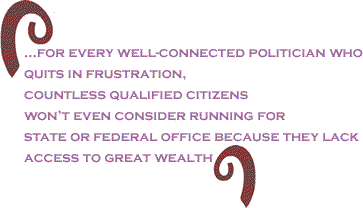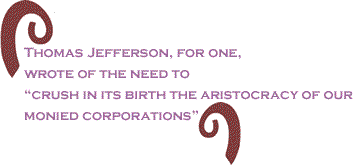
|
|||||||||||||||||||||
 |
|||||||||||||||||||||
 |
|
Perhaps it’s a healthy sign of our collective sanity that a new Pew Center poll said 80% of voters aren’t yet able to indicate a candidate they’ll support in the 2008 presidential election, despite the premature media frenzy. Yet the day the poll was released, former Iowa Governor Tom Vilsack showed us a small group of Americans, the wealthiest political investors, are indeed making such decisions, writing large checks to their chosen candidates, and unintentionally taking choices away from the rest of us in the process. Terminating his quest for the Democratic nomination was “ultimately about money,” said Vilsack, who ably raised over $1 million in just weeks, but was completely outgunned by candidates who could generate that in a single event. Equally troublesome, for every well-connected politician who quits in frustration, countless qualified citizens won’t even consider running for state or federal office because they lack access to great wealth. Each recent election has removed us further from representative democracy, toward a system of political apartheid with two distinct participation classes. One comprises the overwhelming majority of Americans who express our preferences with votes and volunteer efforts. The other wields the real power, the ability to finance the bulk of candidates' campaigns and set the menu of candidates and issues. Consequently, the two dominant parties’ nominees will both present comfortable alternatives for most menu-setting elites, but offer little to address the most pressing needs of many citizens (for example, the nearly 50 million Americans like myself for whom a serious medical problem could mean losing our homes and financial ruin). Just one in a thousand adults contributed $1,000 or more to any candidate in 2004, yet presidential hopefuls raised more than 80 percent of their war chests from these elites. Not surprisingly, multi-millionaires and global corporations have since won myriad tax cuts while Congress and the Bush Administration pile mountains of debt on our children. For decades, political reform groups have pursued state and federal legislation to make campaigns more about ideas than fundraising. While weak and over-hyped reforms like McCain-Feingold have become law, in 2006 the U.S. Supreme Court justices demonstrated zero tolerance for laws directly challenging wealthy’s dominance over elections.
Vermont 's Act 64 capped the amount a person could invest in individual candidates for state offices and overall candidate spending, a law that was challenged and reached the Supreme Court in Randall v. Sorrell. Vermont is one of our least diverse states ethnically, but as Daniel Greenwood wrote in ReclaimDemocracy.org's amicus brief on behalf of the State, "the Vermont statute recognizes that the wealth distribution in our country reflects racial divisions, so serious attempts to remedy racial wrongs also must confront the power of wealth". But the justices struck down the limits on candidate expenditures and, while not forbidding contribution limits outright, declared themselves - not Vermonters - the arbiter of an acceptable dollar amount. They declared the $200-$400 limits "unconstitutionally low," though in Vermont $200 could buy statewide television ads. No one should have been surprised by the Court's ruling; its anti-democratic stand was completely characteristic. The Court twice upheld the constitutionality of poll taxes that deliberately disenfranchised poor, mostly black citizens for almost a century, after they gained voting rights via the 15th Amendment in 1870. In 1976 (Buckley v Valeo), the Court ruled financial investments in political candidates are a form of constitutionally-protected speech and largely beyond democratic control. And in 1978, in First National Bank of Boston v Bellotti, the justices declared our Constitution’s authors intended to grant corporations power to spend unlimited sums, influencing the outcome of ballot questions - theoretically our most democratic process. Their dictum didn’t merely lack constitutional basis, it contradicted the best available evidence that, despite the comfort of our Constitution's authors with white male supremacy, they considered corporate power a threat to all citizens. Thomas Jefferson, for one, wrote of the need to “crush in its birth the aristocracy of our monied corporations”. Achieving a truly democratic republic means Americans must recognize the need and opportunity to overrule the Court. How? By amending the Constitution to clarify that “speech” protected by the First Amendment is the expression of ideas, not the purchase of political influence. Combined with full public campaign financing, such action can reverse democracy’s decay and return us to the path our nation followed in our first two centuries, that of steadily expanding political rights, toward encompassing all citizens. Americans differ on whether economic inequality should have limits, but agree broadly that wealth disparity must not result in classes with separate and unequal political rights. The once-accepted poll tax now is seen as a racist, classist embarrassment. Future generations will view our current system of political apartheid in a similar light. Jeff Milchen directs ReclaimDemocracy.org, a non-profit organization working to revoke corporate domination of our country and revitalize representative democracy. The group filed a Supreme Court brief in support of Vermont in Randall v Sorrell. Click here to contact Mr. Michen. |
|
| Home | |
| March
1,
2007 Issue 219 |
||||||||||||||
|
||||||||||||||
| Printer Friendly Version in resizeable plain text format | ||||||||||||||
 |
||||||||||||||
|
||||||||||||||
 |
||||||||||||||
 |
||||||||||||||
 |
||||||||||||||
| |
||||||||||||||
| |
||||||||||||||






























